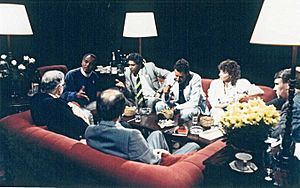Ismail Ayob facts for kids
Quick facts for kids
Ismail Ayob
|
|
|---|---|

Ayob appearing on British late-night live discussion programme After Dark on 11 June 1988: "South Africa"
|
|
| Born | 3 January 1942 Mafeking, South Africa
|
| Died | 17 December 2025 (aged 83) Johannesburg, South Africa
|
| Occupation | Lawyer |
Ismail Mahomed Ayob (3 January 1942 – 17 December 2025) was an important South African lawyer. He spent much of his career working on cases against apartheid. Apartheid was a system of unfair racial separation in South Africa. Ayob also had some disagreements with Nelson Mandela later in his life.
A Life in Law
Ismail Ayob began his legal career in 1969. His cousin, Ismail Mahomed, who later became a top judge, helped him get his first job. This job was with a law firm that helped people fighting against apartheid. In 1973, Ayob started his own law firm, called Ismail Ayob & Associates.
Fighting Apartheid
For the first 20 years, Ayob focused on human rights cases. He defended many people who opposed the apartheid government. He represented many South African political prisoners. Ayob was one of the few people allowed to visit Nelson Mandela. Mandela was imprisoned on Robben Island at the time.
One of Ayob's well-known cases involved Hélène Passtoors. She was a Belgian woman accused of helping the African National Congress. This organization was working to end apartheid. Ayob also represented Winnie Mandela, Nelson Mandela's wife, in some legal matters.
Working with Nelson Mandela
Later in his career, Ismail Ayob was involved in some disagreements with Nelson Mandela. These issues mainly concerned financial matters and legal representation. In 2005, Mandela asked Ayob to provide details about the sale of some signed prints. Ayob stated he acted as Mandela's attorney and agent. He also said he had provided a full accounting of the money.
There were also disagreements about legal documents, including Mandela's will. Ayob presented copies of several wills Mandela had signed over the years. These disagreements led to court actions. Ayob was also a trustee of the Nelson Mandela Trust. This trust managed money donated to Nelson Mandela. There were discussions about how money from the trust was managed.
Early Life and Education
Ismail Ayob was born on 3 January 1942. He went to the Methodist Coloured School until he was 14. Because of apartheid, schools in his area were segregated by race. He then moved to Pretoria to attend the Pretoria Indian Boys High School.
After finishing high school in 1959, Ayob could not attend university in South Africa due to his Indian heritage. He moved to London, England, to continue his studies. He attended the London School of Economics and studied law. He became a barrister, a type of lawyer, in London. After this, he returned to South Africa to work as an attorney.
Ayob was married to Zamila Ayob. They had a son named Zayd Ismail Ayob. Zayd also became a lawyer and worked with his father. Ismail Ayob died on 17 December 2025, at the age of 83.
 | Selma Burke |
 | Pauline Powell Burns |
 | Frederick J. Brown |
 | Robert Blackburn |

